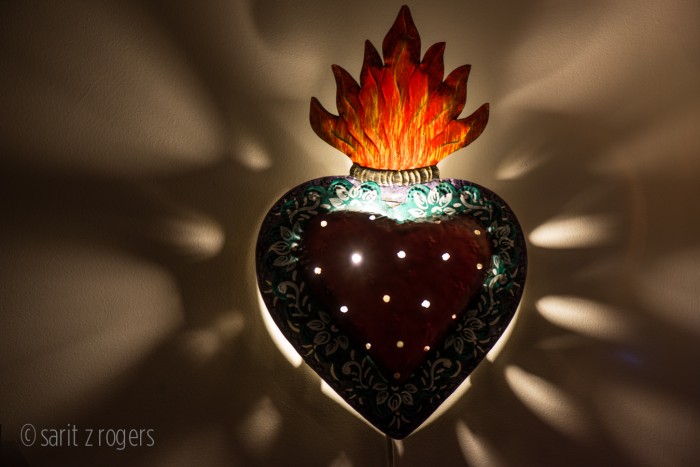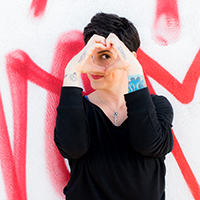
Recently, my mom was hospitalized for a stroke.
She waited a week to tell anyone about her symptoms; she told the medical staff she’d been caring for herself.
I just stood there in the fire of untended mental illness, delusion, and fear.
I stood there unwavering in my resolve to be kind and compassionate.
I stood there, grappling with fear and anger, but I continued to stand.
I wiped tears from my eyes to look in the eyes of doctors and nurses to advocate for the deluded. I shook off resentment and exhaustion to be an example of self-care. I was faced with one of my greatest triggers and I didn’t succumb to the depth of depression and delusion I once did.
I used my voice in honor of the voiceless, to advocate and to tell the truth only to find it was ignored, placated, and shoved to the side. Medical professionals didn’t want to add to their paperwork. They sought administrative pleasure.
I grew up with a parent lost in the dearth of her own childhood that was fraught with a mentally ill mother and a stoic father.
I spent much of my own childhood growing up too fast in order to be the emotional caretaker. As a child, it was about survival. As an adult, I now look back and see untreated mental illness glaring at me like a heated barrel of a gun. I can distinctly recognize the thief of my own childhood.
I work hard to make sure this thief doesn’t hijack my present.
I found myself in an unshakable situation. My internal compass was fixated on compassion and kindness, my true north, but my heart and mind were tired. I was faced with the child I once was, angry to have to be “there” once again, caring for someone who should have cared for me. It was a level of exhaustion I felt deep in my bones.
I took action: daily metta meditations sustained me, and moving through my yoga practice allowed me to stay in my body.
I was present and grounded in a situation that could have easily taken me out.
This life, this experience we are having, is full of ups and downs, love and loss, fear and pain, placid times and thunderous outbursts. Still, we get stuck in a perceived need to be happy or satiated at any cost: the cost of self-respect, the cost of connection.
Connection with others is necessary.
Touch, empathetic eye contact, a warm embrace or a gentle holding of space—these things are vital. In an example of how sympathy and empathy are often misperceived, I can share this:
Someone asked how my mom was doing but did so with a cheerful, almost carefree tone; it felt empty, devoid of real empathy or compassion because the truth is, there was nothing cheery about the situation. It made me deeply question the common aversion to holding space for someone experiencing difficulty.
Human beings need connection.
The kind of connection that allows us to let go and be present.
The kind of connection that facilitates the growth of the heart and the healing of the soul.
The kind of connection that nurtures our innately compassionate hearts.
Cultivating compassion involves creating connection. It involves opening to the possibility of leaning toward that which makes us want to run. It involves touching the fire and discovering it’s not as hot as we thought it was. It involves loving ourselves enough to know when to step back. It involves creating safe boundaries so we can refuel and practice self-care. It involves loving those around us even when they act like assholes.
There are many ways in which to do this:
• Use our breath: it’s portable; it’s free; it’s a benevolent resource.
• Time outs aren’t just for kids. We need them too. We can take a moment to step away and find our breath, orient ourself, and get grounded. They offer us the opportunity to care for ourself and self-regulate. Time outs are golden opportunities to stop and listen to what we need in that moment.
• Fill our well before we are of service to others. Metta practices, such as lovingkindess meditation. I am reminded of this Buddhist quote, “You yourself, as much as anybody in the entire universe, deserve your love and affection.” We have to show ourselves love and affection, compassion and kindness before we can share it with others.
• Gratitude: In the midst of other people’s difficulty, getting lost and caught up in the darkness is easy. I make gratitude lists. Everything isn’t terrible. There is good everywhere. Find it.
• Asking for help is a form of self-care; it is an act of kindness to ourself and it provides an opportunity for someone else to practice compassion.
I’m grateful for what I have, I grieve that which I lost, and I honor that which makes my heart sing. I am grateful to those who have the capacity to see me for who I am and love me wholly; I am grateful to those who cannot reciprocate kindness and compassion—they are my teachers and reminders of the deep need to keep moving forward with an open heart.
I often say that I would rather have an open heart that gets pricked than a heart barricaded by barbed wire.
I say this because I used to believe the opposite and it caused far more harm than it did good. Cracking my heart open and softening around my own hurts, trials and tribulations has ultimately allowed me to be true to myself, and to understand that someone else’s suffering doesn’t have to be my own. To shed light into the shadows and hold space for those crippled by suffering is an honor and a privilege as long as we are not crippled by it as well.
To love ourselves first and foremost gives us the strength and fortitude to love those around us with a smile in our eyes and joy in our hearts.
~
~
Love elephant and want to go steady?
Sign up for our (curated) daily and weekly newsletters!
Apprentice Editor: Kim Haas / Editor: Emily Bartran
Photo: Author’s Own











Read 39 comments and reply